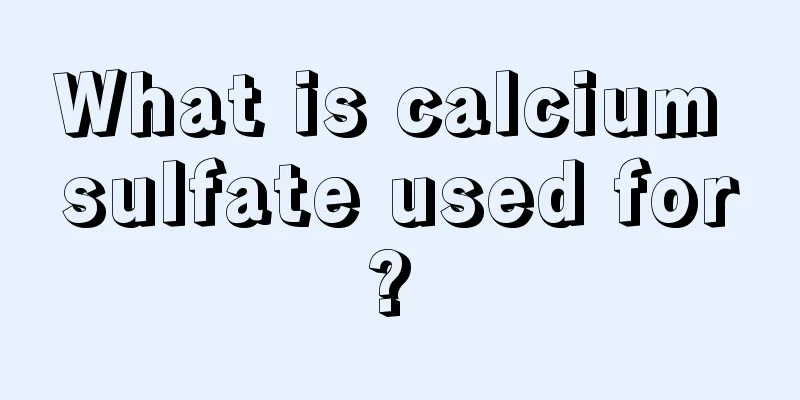What is calcium sulfate used for?

|
We all learned chemistry in school, so I believe we are not unfamiliar with calcium sulfate. However, at that time, our understanding of it was only about its appearance, which was a white crystalline powder. As you come into contact with more and more things in society, you will find that calcium sulfate is actually widely used. It can not only be used in industrial production of fertilizers, but also in food production, such as yeast and canned food. The uses of calcium sulfate are: Raw material for manufacturing cement, calcium sulfate hemihydrate and sulfuric acid. Used as filler in paint and paper industry. Used as fertilizer in agriculture, it can reduce soil alkalinity and improve soil performance. Edible grade can be used as a nutritional supplement (calcium fortification), coagulant, yeast food, dough regulator, chelating agent, and also as a tissue strengthener in canned tomatoes and potatoes, a hardener for brewing water, and a flavor enhancer for wine. In addition to being used in large quantities as a building material and cement raw material, gypsum is widely used in rubber, plastics, fertilizers, pesticides, paints, textiles, food, medicine, papermaking, daily chemicals, arts and crafts, culture and education, and other sectors. In areas lacking sulfur resources, it can be used to make sulfuric acid and ammonium sulfate. Colorless and transparent gypsum can be used as optical material. Used as filler for epoxy resin, it can be used to prepare epoxy resin adhesive with high strength, high temperature resistance and good wear resistance. It can also replace asbestos to produce asbestos-free friction materials. Calcium sulfate White monoclinic crystals or crystalline powder. Odorless. It is hygroscopic. 128℃ loses 1 molecule of crystal water. All water is lost at 163℃. It is soluble in acid, sodium thiosulfate and ammonium salt solutions, soluble in 400 parts of water, less soluble in hot water, very slowly soluble in glycerol, insoluble in ethanol and most organic solvents. Relative density: 2.32. Irritating. It usually contains 2 waters of crystallization and exists in nature in the form of gypsum ore. Properties and stability Avoid light, open flame, high temperature. It is sparingly soluble in water, but soluble in acids, ammonium salts, sodium thiosulfate and glycerol. Slightly soluble in water. Soluble in hydrochloric acid. Gypsum deposits are mainly caused by evaporation and deposition, and are the product of chemical deposition, which has certain requirements on lime specifications and quality. |
<<: The best topical medicine for killing fungi is
>>: What are the uses of magnesium oxide?
Recommend
What is the enamel on your teeth?
For those who like to eat sour fruits such as sou...
Summer is the golden season for calcium supplementation
The hot summer is coming soon. In recent days, th...
Can avocado be stored in the refrigerator?
If you buy a lot of avocados, you can store them ...
What should I do if my heart is not getting enough blood? What are the dietary tips?
Many people often feel heart pain, have difficult...
Can bone marrow regenerate?
Bone marrow can also regenerate. Bone marrow cell...
How to extract bone marrow
In daily life, we often see on TV that many leuke...
Postoperative care after radical renal cell carcinoma surgery
Since the early symptoms of kidney cancer are not...
What can’t you smell during early pregnancy
As an important period of life, women do have to ...
What are the reasons for rapid hair growth?
Hair is the most important hair tissue for people...
How to apply double eyelid tape if your eyelids are thin
Every woman wants to have a pair of bright eyes, ...
Can iodine kill fungi?
Iodine is a medicine used to treat skin infection...
Is it good to eat pumpkin seeds for lung cancer?
Pumpkin seeds are a type of nut. They are a very ...
Does watermelon have parasites?
The weather is hot in summer, and many people lik...
Is endometrial lesion cancer? Not necessarily
Endometrial lesions are not necessarily cancers, ...
What is the reason for feeling weak and listless
Nowadays, people are living in a very busy pace o...









